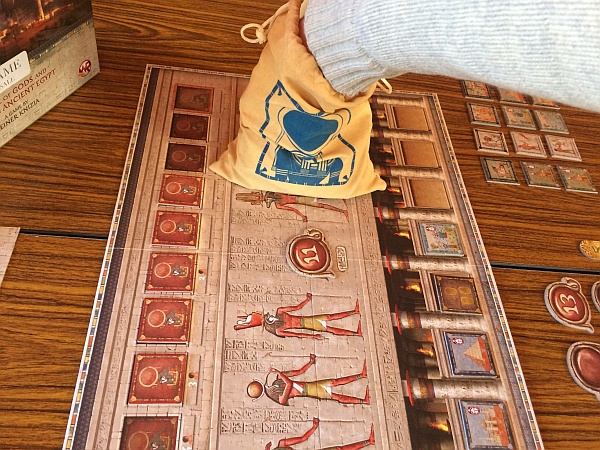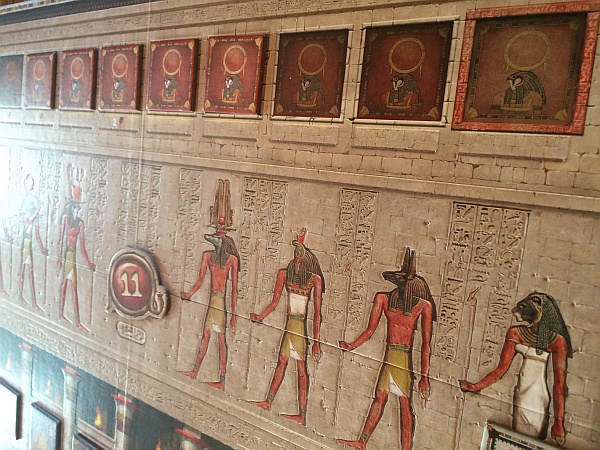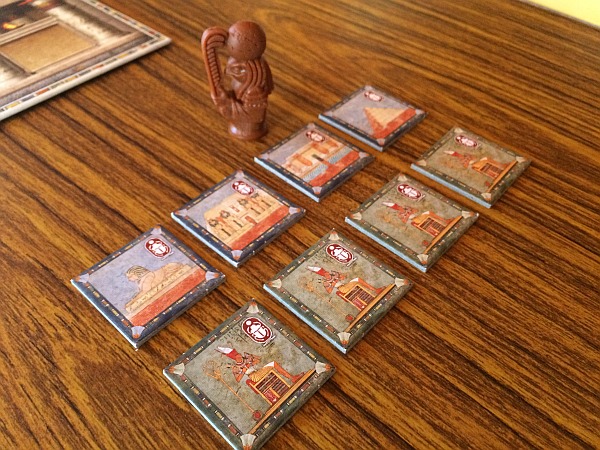Ra Review
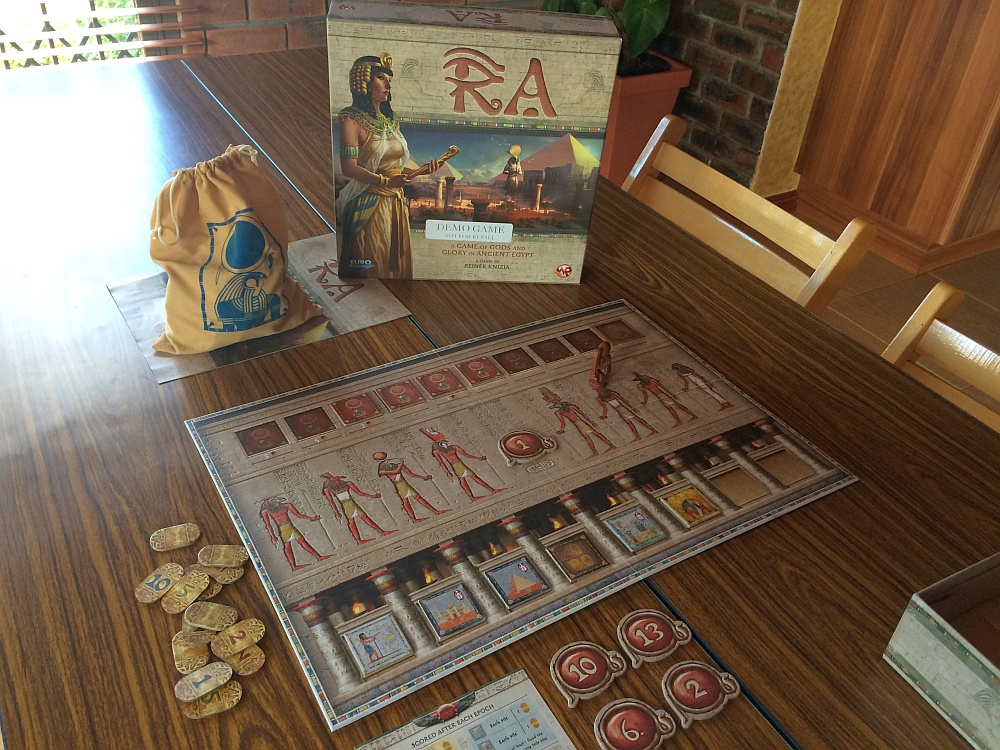
What is it? Timing. This elusive herald of Chronos is not given to spontaneity, arriving when and how She feels like it. She is seduced by intricate planning, favouring those civilisations that don't wait for planets to align to carve the path of human progress. Her song is that of careful planning, seizing upon opportune moments to negate the forces of uncertainty, staying their hand from forcing yours. Does this bid at reprinting of one of Knizia's famed masterpieces receive Her blessing, or should you pass on this offer to the peril of another?
Over ageless dynasties, control over the populations will change. Pharaohs will come and go but history, and the Gods, will remember it all. As Egyptian god of the Sun, Ra watched over thousands of years the rise and fall of leaders and now you will fulfill that role of leader, deciding what elements of your civilisation will flourish and who at the end of 3 Epochs will have created the Egyptian legacy to be remembered.
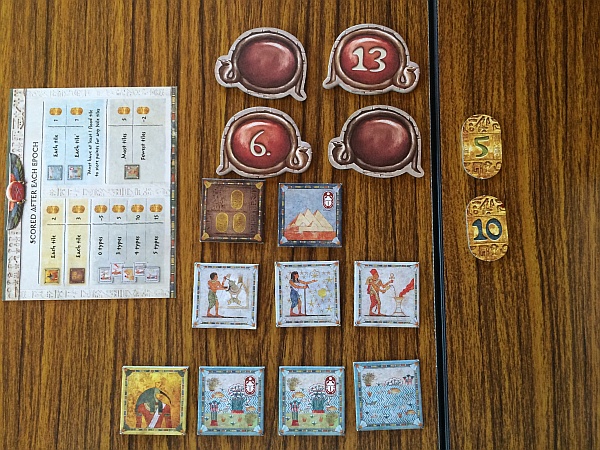
You’ll need the God’s blessings, Civilians to perform jobs and some monuments to be heralded at the end of an era
Now with that introduction you’d be forgiven for thinking you’d be diving into a game which showcases one of the most historically fascinating parts of history, a period which many claim as one of the cradle eras of modern civilisation. You start to imagine tombs, monuments, gods and mythology and while you’re not incorrect that those elements are in the game, you’ll be sadly disappointed that these are nothing more than mere postcards to the arm chair traveller. Sadly my fellow gamers, Ra is no thematic masterpiece that buries you in the sand with Scarab beetles to meet Anubis. However, when you brush away the sand with a delicate archaeological brush, you may find one of the hidden treasures from the previous century you never knew of.
Ra is an auction game with set collection elements for 2-5 players which many have dubbed one of Reiner Knizia’s masterpieces published during his golden years of historically “themed” games, along with Samurai and Tigris and Euphrates. Players will compete to win auctions and collect various sets of tiles over three Epochs (rounds) and score accordingly to be left with the most victory points at the end of the game. At the beginning of the game, each player will begin with a set of three or four bidding tiles (depending on player count) with numbers on them called,Sun disks that they will spend during each the auctions to win the tiles. These sun disks are numbered 1-16 and are evenly distributed among players so that each player will have a low number, one or two mid numbers and a single high number. For example in a 4 player game where each player has 3 sun disks, one player would have 13, 6 and 2 while another would have 12, 7 and 3. All the tiles are placed into the cloth bag and the Ra token (small miniature of the Sun God) is placed next to the board.
When the game begins, players will in clockwise order chose one of three actions: draw a tile from the bag and place it on the board, call for an auction by invoking Ra, or spending a god tile to claim a tile already on the auction track. Drawing tiles out of the bag will create the auction track of tiles which players will be bidding on when an auction occurs and aiming to gather the various tiles that will form their strategy for victory and the most points at the end of each epoch. Invoking Ra will begin an auction and you’ll need to already have won an auction to have god tiles in front of you to spend to take tiles from the existing auction track.
Ra is all about getting the all important tiles you need and there is a ton of variation in the bag, bulging with expectation as you dip your hand into it for the first time. Much like any successfully civilisation, each tile has a particular function that you ignore at your peril, making choices critical for maximum victory points.
- God Tiles are worth 2 points at the end of each age if not used to switch with tiles in the auction track
- River Tiles and floods are worth 2 points each as long as you have at least one flood tile
- Pharaoh Tiles give you 5 points if you have the most and minus 2 points if you have the least
- Civilisation tiles bring you points in variety, with 3 or more different tiles offering you various levels of points while having none will give you minus 5 points
- Monument Tiles will only yield points at the end of the third age, with 7 or more different monuments yielding you multiple points and collections of 3 or more of the same monument also granting large numbers of points
- Money tablets which will grant you 3 points each
- You’ll want to avoid disaster tiles that relate to Pharaoh, Civilisation, River and Monument tiles as they will cause you to lose 2 of that tile type when won in an auction
As these tiles are drawn out and placed on the auction track, players will become more and more eager to add them to the collection, as winning the auction will net you each and every tile laid before you on the track. Need some more pharaohs to ensure you have the most at the end of this Epoch? Needing to get hold of all those different civilisation tiles that will net you big points or simply HAVE to snag that flood tile to make your river tiles yield points? It’s a fascinating game of timing when players are trying to get the most out of each victorious bid as invoking Ra will give you the edge in auctions, but not without some risk on your part. However fate is not always in your control as auctions can be initiated by the inadvertent drawing of a Red Ra symbol tile, which is then placed on its own track at the top of the board.
So remember those Sun disks with the numbers on them? Those are what you use to place a bid on what you think the tiles on the auction track are worth to you. After invoking Ra or drawing a Red Ra tile, the player to your left will get one, and only one chance, to place one of his sun disks of what he feels the lot is worth or passing on to the next player to bid in turn order. This auction will go around the table only once, with the player invoking Ra having the last choice of the bid on the goods. Whoever placed the highest bid for the tiles wins the auction and takes all the tiles on the track. Remember I said there were a couple of risks with this action? Well if everyone chooses to pass on bidding for the tiles, the player who called Ra must bid one of their tiles for the auction and also exchange their winning sun disk bid with the number from the previous winning auction sun disk. The disk they collect is placed face down in front of the winning player and they now are left with 3 or two remaining bids for that age, with the rule that once a player has made their 3 or 4 bids in an Epoch they can no longer take part in auctions for that round.
Epochs can end in one of two ways, either with all players using all of their Sun Disks for the Epoch or when enough Red Ra tiles have been drawn and have filled up the Ra track at the top of the board, which acts as a countdown timer for the Age. Players will need to balance the spending of their auction tiles with the inevitable end of the age, with all unused sun disks being carried over to the next Epoch and all used sun disks flipped over for the next round.
At the end of each Epoch, scoring will happen in line with the mechanisms above and then some tile discards will happen. Monument, Pharaoh and River Tiles will carry over from one age to the next, while gods, floods, money tablets and civilisation tiles will be discarded at the end of each epoch and returned to the box. The player who has the highest number sun disk in front of them will begin the next round and play will continue in the same way over the next two Epochs, when final scoring will occur. Scoring over all three ages will be tallied, with Sun disk and monument scoring happening in the third Epoch, and the player with the most victory points wins.
Simple mechanics, and yet Ra is a game with many horrific gut-wrenching decisions. You’ll watch everyone greedily watching the auction track to fill up, only to have the Epoch end before you’ve spent all your sun disks after hoarding them greedily to your own disappointment. You’ll be goaded into bidding for tiles you’re not even that interested in, simply to claim the number 13 sun disk for the following epoch to ensure you can win a vote without anyone being able to contest. You’ll jeer as the Red Ra tile is drawn with nothing in the auction track forcing everyone to pass and watch the Epoch end prematurely, causing you to lose 5 points because you have no civilisation tiles. There is such a fine balance to this game, while you are forced to play the players as their options dwindle and play the odds of the game as your own do the same. Do you collect monuments early for the 3rd Epoch scoring? Do you hold out on that last sun disk to make sure you get a flood tile to make sure your other 7 river tiles score, knowing that every other player at the table knows you need that tile and every one of them can outbid your low number 4 sun disk making the quest seem futile? What is coming out the bag next? What can you possibly do to leverage each advantage to get what you want?
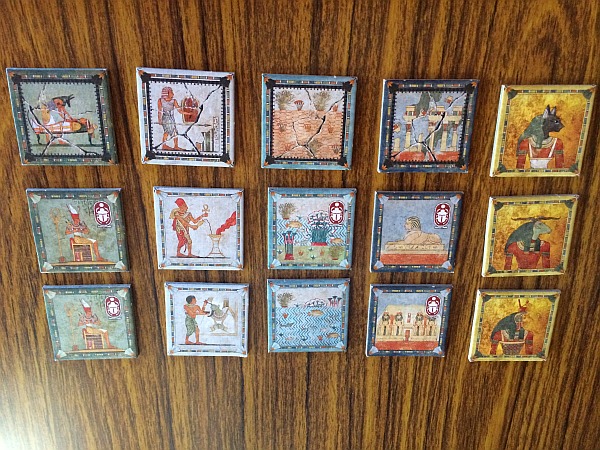
Cracked disaster tiles can potentially undo all the magnificent work done by your people during the Epoch by destroying two corresponding tiles in your collection
Ra has the great gateway mechanics that make this game an instant hit with my family of new gamers and enough interesting mechanics to get my board gaming group smack talking around a table. While the theme is identical to every other Reiner Knizia classic, irrelevant, it’s in the mechanics of game design that the doctor has produced yet another classic game that appeals to almost every type of gamer. The simple auction mechanic has players making a single thoughtful bid, making gameplay move rapidly and avoiding the back and forth pit that occurs in many auction games I’ve played. There is as much playing of the other players around the table as there is playing the bag of tiles, and you’ll always feel that you have options to go after. Whether you’re waiting to have less players to bid against when spending your lower sun disks, or holding the most valuable sun disk next round and just waiting for the auction that has everything you want knowing with certainty that you can out bid everyone at they table and the satisfaction of knowing they understand your power.
Do I recommend Ra? Wholeheartedly, however it is not without its caveats. Ra has a very well designed single element of the auction, however that is the extent of the game, which may not appeal to the gamer who needs complexity to find fulfillment. It is also totally devoid of theme, as much as the cover wants to you to believe that you’re building an Egyptian dynasty you are simply collecting tiles that could be blue, green, red, brown and yellow and assigning roles to them. The theme does not flow into the game besides the fact that the artwork and components are plastered with images from an ancient era. in the design of the components, while solidly constructed, there are instances that you’ll find yourself having to look closely to differentiate some of the tiles from each other, which means that when showing interest in a tile, you may find everyone knowing your intentions and we have also found the edges of the tiles peeling a little bit with wear, so possibly a varnish spray would be recommended. Despite these minor gripes, Ra is an amazing auction game and possibly the best of its genre I’ve ever played. Everyone who I have played it with has had good things to say about it and if you pull open a chair at your table for me, I’ll never once say no to invoking the sun god.

Pros:
- One of the best auction mechanics we’ve played
- Great gateway that appeals to almost every gamer type
- Simple mechanics with great strategic decisions
Cons:
- Themeless
- Tile colours can blend together making differentiating tougher

